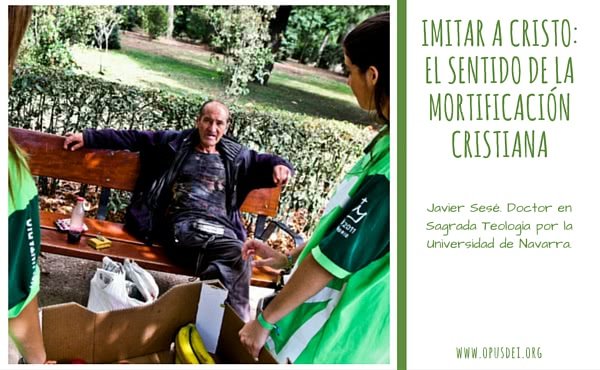"God is Love," St. John affirms in his first letter: "In this the love of God was demonstrated among us, that God sent His only Son into the world, so that we might receive life through Him. In this is love, not that we loved God, but that He loved us and sent His Son to be the propitiation for our sins."
The great manifestation of God's infinite love for man, for each and every one of us, is the Passion and Death of Jesus Christ on the Cross.
Returning love for love
It is characteristic of a person in love to be grateful, to want to respond to love with love; and love is manifested in words and deeds. The greater the love, the more expressive are the words and the more generous and sacrificial are the deeds.
That is why devout Christians of all times have striven to manifest their love for God in words (prayer) and deeds (sacrifice), responding to God's love manifested in his Word (preaching, Gospel, teaching) and his Sacrifice on the Cross.
But it is also characteristic of people in love to want to be as similar as possible to the person loved, to follow in their footsteps.
Corporal mortification
That is why, since the beginning of Christianity, those who love Christ opted for sacrifices like Christ's: to Jesus' fasting they responded with fasting and abstinence; to His not having "a place to rest his head" with vigils, sleeping on the floor or on hard beds and pillows; to His scourging, with flagellation (disciplines); to His crowning with thorns, with spiked belts or similar devices (cilices), etc.
All of this with the generosity of lovers, and with the humility and prudence of those who know they owe their very lives to Christ's love: that is why, with a few pathological exceptions always condemned by the Church, those who imitated and still imitate his scourging, crowning with thorns, or carrying of the Cross do not nail themselves to a cross with real nails, or to endanger their lives and health by taking these corporal mortifications to the extreme.
Without danger to health
There have been many martyrs, proud of being tortured and killed for the sake of Christ as He died for us; but no saint has died or put himself in danger of death by voluntarily wearing sackcloth or using the discipline, or by fasting.
An impressive piece of trivia: one of the most austere and mortified saints of all time, a model for entire generations of penitents, is St. Anthony the Great who died at the age of 105, at a time when life expectancy was barely over 20 years!
Christian mortification: a path, not an end
Love for God is therefore the deepest and most decisive reason for any kind of Christian sacrifice. This love includes the awareness of one's own sins and miseries and seeks the forgiveness of the One who was scourged, crowned with thorns and crucified, in order to forgive us for those same sins. It is a love that wants to accompany, even modestly, the purifying pain of the Beloved, who bore the sins of all men.
But the Sacrifice of Jesus culminates in His Resurrection, in the glory of Heaven, in total, definitive and eternal Happiness.
Mortification in any form is a means, a way, and not an end. Sacrificing oneself for love ends in the fullness of love without a trace of pain or sadness, in God Himself, who is Love, Joy, Happiness, Glory.
